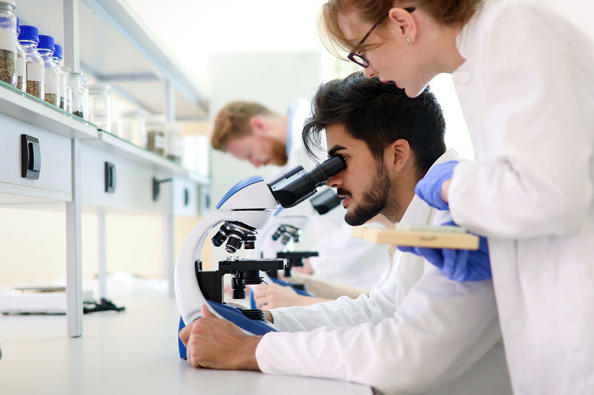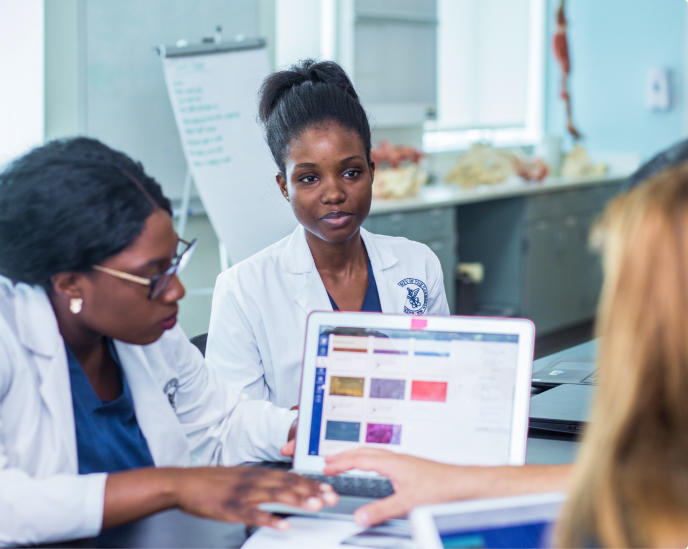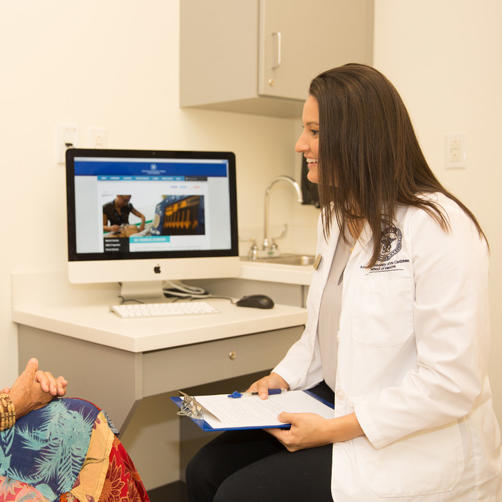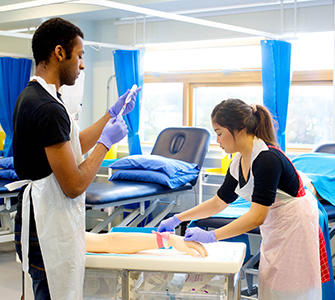If you have ever seen a doctor about an illness, chances are you have benefited from the services of a pathologist. However, you probably never saw the pathologist. To explain why, we’ll answer a few questions, including: What is pathology? What does a pathologist do? Are there different types of pathology? Are pathologists medical doctors? And, how do I become a pathologist?
What Is Pathology?
Pathology is the study of the causes, nature, and effects of disease. A pathology doctor — a pathologist — is a medical doctor who has completed residency training in pathology. Pathologists are experts in the laboratory techniques used to study disease. You’re likely to find pathologists working in labs alongside scientists with special medical training. Pathologists study tissues and other materials taken from the body. They analyze these items to diagnose illness, monitor ongoing medical conditions, and help guide treatment.
A pathologist is a vital part of any patient’s care team. And yet, the pathologist may be largely invisible to the patient. That’s because much of a pathologist’s work is conducted behind the scenes. Pathologists draw on their medical knowledge, investigative experience, and curiosity to help solve the mysteries of illness, disease, and recovery — as well as decline and death.
What Do Pathologists Do?
A pathologist studies fluids, tissues, or organs taken from the body. Pathologists often work with a surgically removed sample of diseased tissue, called a biopsy. The pathological examination of an entire body after death is called an autopsy.
Pathologists are often involved in the diagnosis of illness. A pathologist may examine a sample of tissue for a virus, bacteria, or other infectious agent. The vast majority of cancer diagnoses are made by, or in conjunction with, a pathologist. Pathologists may also help guide the course of treatment. For example, a pathologist may analyze blood samples, helping to monitor and track the progression of a blood-borne illness. Modern pathologists have more than microscopes at their disposal. They may use genetic studies and gene markers to diagnose a hereditary condition.
Much of a pathologist’s work culminates in the form of a pathology report. In such a report, the pathologist details the analysis of samples sent to the lab by a doctor or other professional, meticulously laying out their findings.
How Do You Become a Pathologist?
A pathologist’s education begins with a four-year undergraduate degree, most often in chemistry or the biological sciences (see AUC’s medical school requirements. The next step is four years of education at an accredited medical school, such as American University of the Caribbean School of Medicine (AUC)*. AUC students receive a Doctor of Medicine (MD) degree upon graduation. They must then pursue a medical residency. A pathology residency usually lasts three years, but combined residencies in both anatomical and clinical pathology (see below) may take four years or more. Physicians who wish to specialize in a particular type of pathology must then complete additional training.
So, how long does it take to become a pathologist? It’s usually a period of eleven years from your first day of undergraduate studies to the day you become certified by the American Board of Pathology. That is a long time, for sure, but it’s the minimum amount of time required to become any type of practicing physician, and well worth it in the end.
What Are the Different Types of Pathology?
Pathology is divided into anatomic pathology and clinical pathology. However, most pathologists practice both. Anatomic pathology involves the analysis of body organs and tissues. Anatomic pathologists evaluate such tissue specimens as PAP smears, biopsies, and surgical resections, while also performing autopsies. Clinical pathology involves the analysis of such bodily fluids as blood and urine. Both anatomical and clinical pathology have several subspecialties, including:
- Chemical pathology: the study of bodily fluids and toxicology to diagnose and manage disease
- Cytopathology: the diagnosis of diseases — especially cancer — through the study of cells from tissues, fluids, and secretions
- Dermatopathology: the study of skin diseases at a microscopic level
- Forensic pathology: the examination of corpses during autopsy to determine causes of death
- Hematopathology: the diagnosis of diseases of blood, bone marrow, and lymph nodes
- Molecular genetic pathology: the diagnosis and monitoring of genetic and infectious diseases and cancers
- Neuropathology: the diagnosis of nervous system diseases through the examination of tissues and cells
- Pediatric pathology: the examination of tissues and cells to study disease and illness in fetuses, infants, children, adolescents, and young adults
- Transfusion medicine pathology: the management of blood bank services
Meet a Pathologist
Constantine “Aki” Kanakis, MD, a 2020 AUC graduate, is a resident physician at Loyola University Medical Center Department of Pathology and Laboratory Medicine. We asked Dr. Kanakis to describe the role of a pathologist.
Q: Why did you decide to go into your specialty?
A: So many reasons. After seeing firsthand how patients go through the process of being managed and treated for a variety of illnesses, nothing I’ve found comes as close as pathology to the root of medical philosophy. It helps that I worked for a decade as a medical laboratory scientist in clinical diagnostics. Those years cemented my interest in a field that treats all the patients in a hospital or community.
Nearly 70% of information in a patient’s chart comes from laboratory-derived diagnostic data, and virtually all cancer diagnoses are signed out by pathologists. With as many subspecialties and fellowships as there are for all clinical medicine, your career path is as broad as you like. And, when it comes to work-life balance, it can’t be beat!
Pathology focuses on the most accurate and expedient final diagnosis of illness in order to make sure that every patient receives the best and most prompt care. And, while we work primarily with our patient-facing colleagues to coordinate a strong interdisciplinary approach to medicine, some of us see patients, too. For example, a pathologist trained in transfusion medicine sees patients who need apheresis or cellular therapy, or who have transfusion-related complications.
We [pathologists] are an integral part of intraoperative cancer spot diagnoses that determine long-term implications and treatment. Invaluable prognostic and diagnostic information comes from our tireless research, and we’re the ones to turn to when medicine becomes a mystery.
A long time ago, pathologists were called the “doctor’s doctor,” but I like to think we’re an inseparable part of practicing medicine. Who do you think makes and validates COVID-19 tests out of thin air? We do way more than just autopsies. (Even though those are important for their medical and public health implications.)
Q: Any advice to medical students considering the specialty?
A: This is an invisible specialty! Please find exposure to the field, do a rotation, meet your friendly neighborhood pathologists, and engage in something that could change your future. There are plenty of stereotypes about every specialty, and ours is often brushed aside (or kept in the basement). But I assure you, we love to work with anyone who has a passion for engaging patient care at this level.
Q: What’s the most rewarding part of your job?
A: First, those of us in pathology and laboratory medicine pride ourselves on not managing one or 10 patients at a time, but rather a whole demographic of patients. You rarely practice pathology alone, and when you’re part of a thriving department, you care for a whole region or community of patients together. You’ve got a front-row seat to trends in cancer, infections, and any disease that needs attention. Lab data is public health data.
Second, pathology is full of fulfilling experiences. Behind every single microscopic slide or laboratory test is a living, breathing patient waiting to discuss the results of your interpretation with their PCP or specialist. If you’re a surgical pathologist in a regional hospital, you might be paged to come in for a frozen section intraoperative consultation on a suspicious brain mass and rule out or diagnose cancer then and there. If you’re a hematopathologist, you might be sent a critical consultation on a bizarre lymphoma by one of your hematology/oncology colleagues. Your call and your diagnosis can change the course of an entire treatment plan, and that’s something to take very seriously and [that] can be very rewarding.
Exploring a Career as a Pathologist
As a specialty, pathology attracts critical thinkers and problem solvers. Pathologists tend to be methodical, stepwise thinkers with an eye for recognizing patterns in evidence.
Many doctors spend most of the day seeing patients. Pathologists, on the other hand, generally spend most of their time in the lab. As a result, pathologists tend to enjoy more regular hours and a better work/life balance than many other specialists.
Many pathologists work in hospital or independent laboratories. Others work in academic institutions or private practice. A typical day for a pathologist might begin with taking in samples for analysis and planning experiments. The middle of the day might involve working with lab equipment to analyze samples and refine results. The afternoon might be spent communicating results to other members of the treatment team.
Now you know the answer to the question, “What is pathology?” Do you think a career as a medical mystery solver may be right for you? If so, see what AUC is all about: Check out our residency outcomes (with several in pathology) and learn about our campus in beautiful St. Maarten. Start creating the best medical school application you can and, when you’re ready, apply for admission to AUC. Your medical future awaits!
*American University of the Caribbean School of Medicine is accredited by the Accreditation Commission on Colleges of Medicine (ACCM, www.accredmed.org), which is the accreditor used by the country of St. Maarten.





